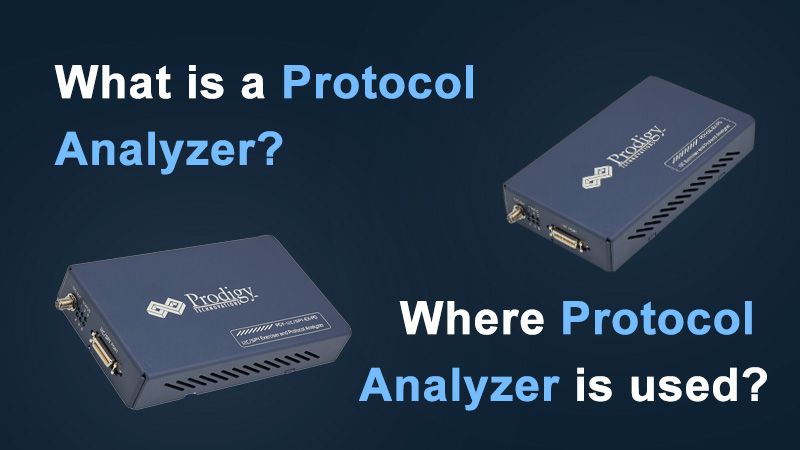
Where is the Protocol analyzer used?
Embedded System Testing :
Embedded Systems have multiple devices and each of the devices uses the bus to communicate with the main chip or processor and other devices in the system. The Embedded system generally has SPI or I2C device to communicate with the EEPROM device and I3C to communicate with the sensor interface. The protocol analyzer can be very useful to debug and validate the embedded system and figure out failures of any of the devices in the embedded system.
Post-silicon validation:
During the chip development process, Once the Chips is back from the foundry all the interface of the Chip or SoC needs to be tested. Most of the SoC or chips have I2C, SPI, and I3C or eMMC based on the application of the chip. The Protocol analyzer is a very handy tool for the hardware validation engineer to debug the bus interfaces.
Pre-Silicon validation:
In chip or SoC development, before the chip is taped out its engineering manager needs to get the confidence development of the chip, Emulation platforms like Zebu or Palladium are commonly used to do the hardware validation. The protocol analyzer can be a very useful assist tool for the emulation engineer to check for the sanity of the communication interface like I2C and SPI along with the emulation Platform.
What are the various types of Protocol analyzers used in SoC or embedded System Development?
I2C Protocol Analyzer:
I2C or IIC (Inter-Integrated Circuit) is the most commonly used communication interface between two devices. This is the simple two-wire protocol used to communicate between the Integrated Circuits in the embedded system. An I2C Protocol analyzer plays very important in the debugging of the I2C Bus interface.
SPI Protocol Analyzer:
SPI Serial Peripheral Interface is the most commonly used communication interface between two devices, similar to I2C but for higher speeds of transfer. An SPI Protocol analyzer plays very important in the debugging of the SPI Bus interface.
SPMI Protocol Analyzer:
SPMI (System Power Management Interface) is standard with a 2-wire synchronous serial, bidirectional interface that connects the integrated Power Controller(PC) of a System on- Chip (SoC) processor system with one or more Power Management Integrated Circuits (PMIC) voltage regulation systems. An SPMI Protocol analyzer plays very important in the debugging of the SPMI Bus interface.
I3C Protocol Analyzer:
I3C serial bus interface is emerging as a chosen interface for all future sensor connectivity in the mobile phone and automotive Industry. An I3C Protocol analyzer plays very important in the debugging of the I3C Bus interface.
RFFE Protocol Analyzer:
The RF Front-end control interface (RFFE) serial bus interface is used for controlling RF frond-end devices. There is a variety of front-end devices such as Power Amplifiers (PA), Low-Nose Amplifiers (LNA), filters, switches, power management modules, and antenna tuners. It is widely used in mobile devices. An RFFE Protocol analyzer plays very important in the debugging of the RFFE Bus interface and mobile subsystems.
eMMC Protocol Analyzer:
emmC Protocol Analyzer enables design and verification engineers to test and debug SD, SDIO, and eMMC by triggering command, response, data, or CRC errors. An eMMC Protocol analyzer plays very important in the debugging of the eMMC Bus interface and mobile subsystems.
UFS 4.0 Protocol Analyzer:
UFS 4.0 Protocol Analyzer offers capture and debugging of data across MPHY, UniPro, and UFS 4.0 protocol layers. A UFS 4.0 Protocol analyzer plays very important in the debugging of the UFS Bus interface and mobile subsystems.
Automotive Ethernet Protocol Analyzer:
Automotive Ethernet interface is used in-vehicle bus communication and also to support feature-rich ADAS in smart and connected vehicles. An Automotive Ethernet Protocol analyzer plays very important in the debugging of the Ethernet Bus interface in a connected Vehicle.
What are the various Features of the Protocol analyzer?
The protocol analyzer comes with the following features :
●Triggering: Each of the protocol analyzers and equipped with various kinds of triggers, multi-level triggers, multiple consecutive event triggers, etc.
●Protocol Layer support: The protocol analyzer tool has complete support for protocol analysis. All the layers of the protocol are analyzed.
●Traffic Generator: The protocol analyzer generates protocol-specific data and timing and gives the validation engineer complete control of data and timing. The traffic generator also can generate back-to-back traffic on the communication bus.
●Error Injection: The protocol analyzer is also equipped with error injection capability. Bit error test patterns can be generated and sent over the communication channel.
How to Integrate Protocol Analyzer in the Development Environment?
The protocol analyzer provides access to API libraries. These APIs can be integrated into the development environment and an advanced level of validation and testing can be achieved. The API can be used to generate traffic on the communication bus as well as capture the traffic on the communication Channel.
What is Prodigy doing to advance in the Protocol analyzer market?
Prodigy Technovations regularly looks at the new trends in the market and comes up with a new set of products for the Protocol analyzer market. Prodigy Technovations has an expert team working on the latest cutting-edge technologies and Prodigy Technovations is going to lead the market in the coming years.



